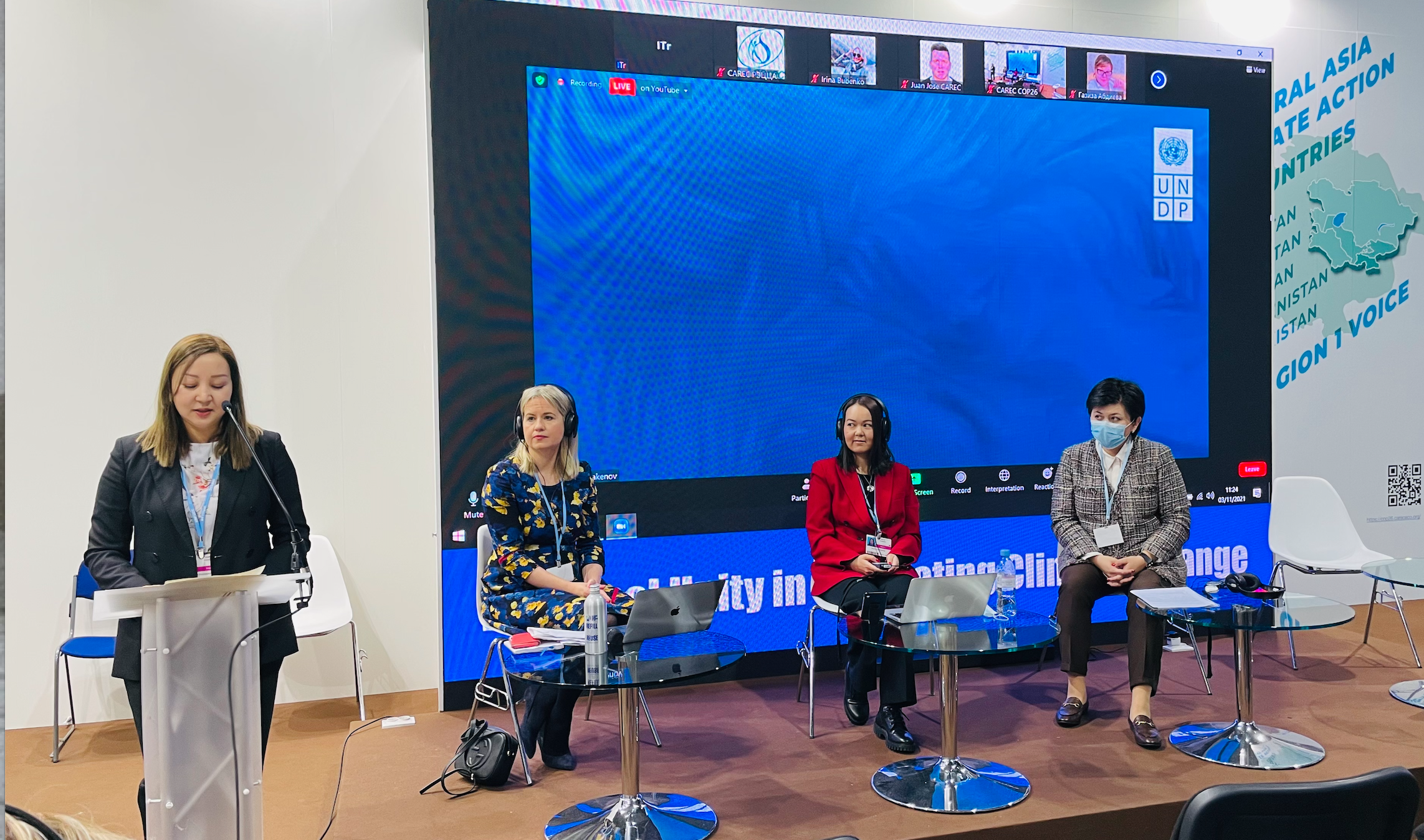GLASGOW – The Central Asian pavilion hosted the events devoted to green investments and energy conservation that contribute to carbon neutrality on Nov. 3-4 as part of the 26th session of the Conference of the Parties to the UN Framework Convention on Climate Change (COP26).

Kopbayeva Ainur, the Deputy Director of the Department of Climate Policy and Green Technologies of the Kazakh Ministry of Ecology, Geology and Natural Resources, delivers remarks about the greening of the economy and environmental protection at the COP26 on Nov.2.
The experts shared their opinion that now more than ever is the time for action because the pandemic has created unprecedented economic destruction, accelerating global problems, such as social and income inequality.
In this regard, green finance and accounting for natural capital are important in climate action strategy and implementation. This idea is reflected in the recently released Climate action and the accountancy profession: building a sustainable future report. It shows that the accountancy profession plays a major role in net zero transition plans, including 2030 targets.
Ainur Kopbayeva, the Deputy Director of the Department of Climate Policy and Green Technologies of the Kazakh Ministry of Ecology, Geology and Natural Resources, said that the greening of the economy and environmental protection is one of the main principles of the country’s new course.
Kazakhstan has adopted national and regulatory programs and strategies for sustainable development, she said. The renewable energy market is also developing in the country. Currently, 126 renewable energy facilities with a total installed capacity of 1,975 megawatt, which is twice as much as in 2019. The number of renewable energy facilities includes 33 winds and 49 solar hydroelectric plants.
The new Environmental Code provides the mechanisms to stimulate businesses to implement green projects. “I think that these green finance instruments create a solid foundation for achieving the goals of the decarbonization of the economy. Kazakhstan is open for dialogue and interaction with financial institutions to implement green projects and attract green investments,” Kopbayeva said.
It is reported that the United Nations Development Programme (UNDP) also plans to provide support to the Kazakh government in terms of green financing.
According to UNDP International Technical Advisor on Green Technologies Oleg Khmelyov, the UNDP implemented more than 90 projects in this field. Their benefits include the improvement of the quality of life (health and comfort), reducing gender inequality, creating jobs and improving the energy management system of buildings.
Overall, the country’s energy sector is the largest source of greenhouse gas (GHG) emissions with about 80 percent of all annual GHG emissions, of which 32 percent are for the production of heat and electricity generation. The direct burning of fossil fuels covers 69 percent of the final energy use, the rest is accounted for by electricity and heat generated mainly from coal.
Among other initiatives, the UNDP in cooperation with the Global Environment Facility (GEF) launched the Nationally Appropriate Mitigation Actions for Low-Carbon Urban Development 2015-2021 to assist in creating low-carbon development plans and provide financial support mechanisms for energy efficiency.
Kazakhstan’s Damu Entrepreneurship Development Fund, which supports domestic producers, also contributes to the green economy transition. As a result, 118 green projects received loans worth 136.6 billion tenge (US$318 million).
The fund is implementing the projects related to sustainable cities for low-carbon development projects and reducing the risks of investing in renewables. The fund will also work on the implementation of the national action plan to promote the Green Bridge partnership for 2021-2024 to bring the share of renewable energy sources in the energy balance to 15 percent by 2030.
UNDP Deputy Resident Representative in Kazakhstan Vitalie Vremis welcomed the country’s long-term vision of carbon neutrality. “We recognize that access to finance and investment plays a key role in developing countries’ implementation of climate, energy, and other development goals,” he added.
Vremis noted that the UNDP in Kazakhstan supports the efforts of the government in promoting climate actions under the Paris Agreement. Over 25 years of partnership, UNDP has demonstrated the best practices and technologies through more than a hundred projects in the field of sustainable development and urbanization.
On Nov. 1, Kazakh Prime Minister Askar Mamin spoke about the country’s carbon neutrality strategy at the World Leaders Summit, which was held at the COP26.
The conference also saw the historic opening of the first Central Asian pavilion. Kazakhstan, Kyrgyzstan, Tajikistan, Turkmenistan and Uzbekistan agreed to respond to the climate change challenges together “as one region.”
